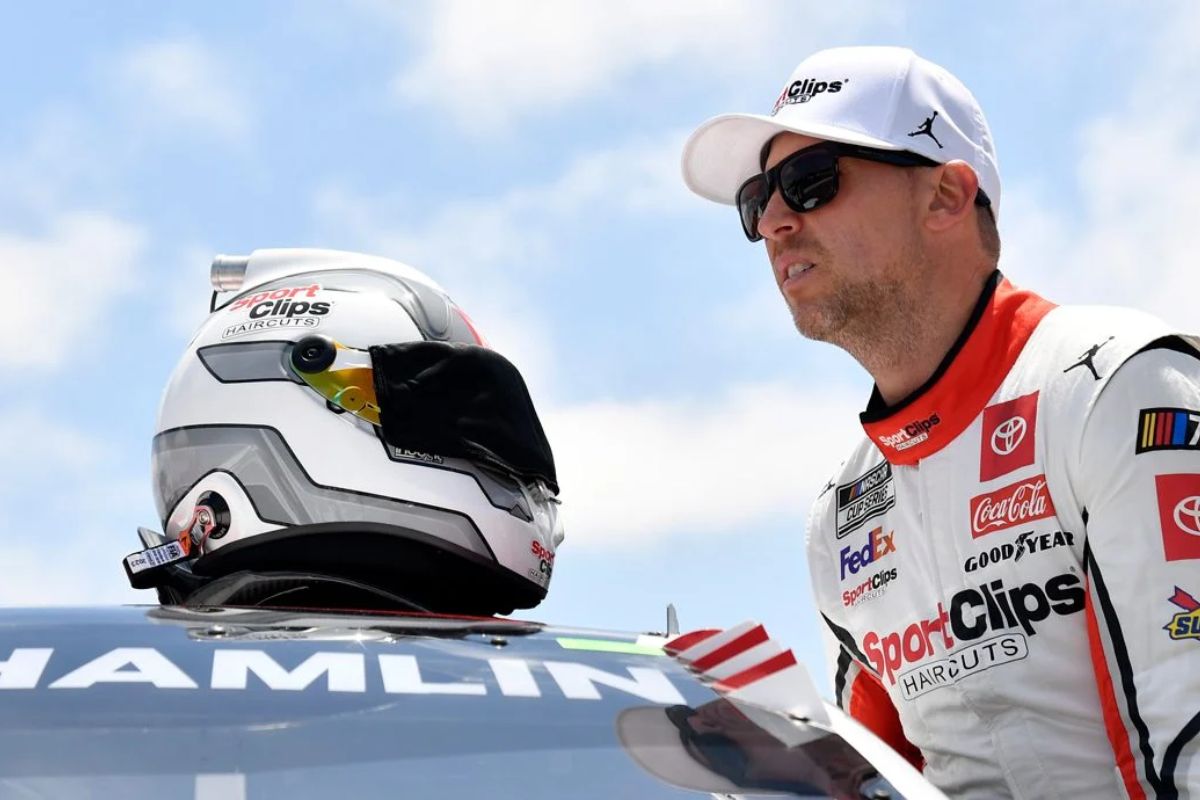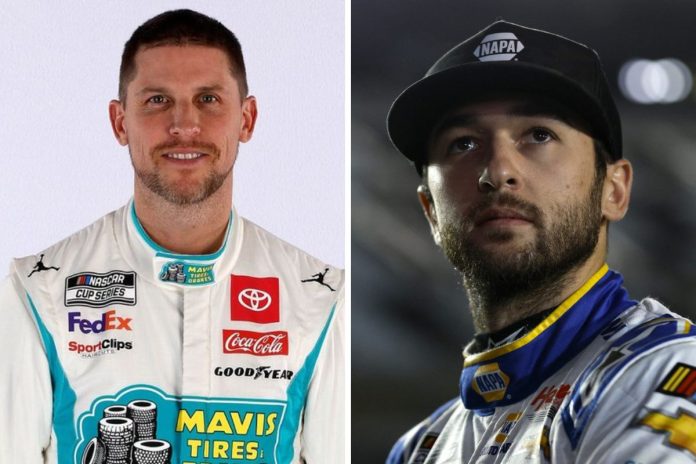Hamlin’s Horsepower Rant: In the wake of Chase Elliott’s significant victory at the AutoTrader EchoPark Automotive 400, Denny Hamlin’s criticism of NASCAR’s horsepower reduction policy has started a discourse on the balance between innovation and tradition within the sport. Hamlin argues that the current regulations may reduce the quality of challenges of racing, potentially reducing the skill set that drivers like Elliott have honed over the years.
Key Takeaways
- Denny Hamlin opposes NASCAR’s reduction of horsepower, arguing it diminishes driver skill and race dynamics.
- Chase Elliott’s recent win demonstrates his competitive skills even under current horsepower regulations.
- Hamlin’s concerns reflect a debate among drivers about NASCAR’s technical direction and its impact on the sport.
- Elliott’s success may suggest that skill and strategy can still prevail, despite lower horsepower settings.
- The ongoing discussion highlights a critical phase in NASCAR, balancing tradition with modern safety and efficiency demands.
Elliott Ends Winless Streak at AutoTrader EchoPark Automotive 400
After enduring a 42-race drought, Chase Elliott won a victory at the AutoTrader EchoPark Automotive 400, showcasing his mastery on the mile-and-a-half track with the Next Gen car. This win came amidst a season punctuated by frequent lead changes and exceptionally high competition levels, evident from the race’s unfolding at Texas Speedway. The event was marked by a record 16-caution period.
The dynamic of the race with its various lead changes among 13 different drivers emphasized the critical importance of timing and precision in pit stops, tire management, and real-time strategy adaptation. Elliott and his team excelled in these areas, enabling him to navigate through the complexities.

The Role of Pushes in Modern NASCAR Racing
Building on Chase Elliott’s recent victory, it is important to explore the increasing importance of pushes from other drivers in modern NASCAR racing, as highlighted in a forthright interview with Dale Earnhardt Jr.
Elliott’s insights reveal that the move from a focus on individual car launches to the strategic necessity of receiving pushes is reshaping race strategies and outcomes. This change intertwines drivers’ fates more closely than ever, crafting a complex web of alliances and rivalries on the track.
Pushes, wherein one car physically propels another by making contact at the rear, have become a tactical element with potential gains and inherent risks. The benefits include increased speed and momentum, which can be vital in overtaking or in defending a lead. However, the precision required in executing a successful push without causing a wreck demands high skill and perfect timing, highlighting a driver’s technical expertise and tactical insight.
Elliott’s Concerns and Adaptations
Chase Elliott’s concerns about the changing dynamics of NASCAR, where the success of a driver’s debut is heavily dependent on competitor support, highlight the importance of strategic adaptability in today’s racing environment. Elliott, recognizing this shift, stresses the necessity for drivers to cultivate a more aggressive yet tactful approach to secure the needed support on the track.
Elliott’s adaptation to these new challenges is various, demonstrating a deep understanding of modern NASCAR’s intricacies. To start with, he has focused on enhancing his relationships with other drivers, understanding that a mutual support system can provide significant advantages during races.
Additionally, Elliott has adjusted his racing style to be more assertive at strategic points in the race, ensuring he is in the right position to receive or give support when most needed.

Hamlin’s Opposition to Reduced Horsepower
Denny Hamlin’s staunch opposition to NASCAR’s reduction of horsepower highlights an important tension between cost considerations and the preservation of traditional racing dynamics. Hamlin, a seasoned driver and influential figure within the sport, articulates a perspective that resonates with a significant segment of the NASCAR community. His argument critical on lowering horsepower reduces the very essence of what makes NASCAR racing thrilling and competitive.
He thinks that reduced horsepower not only dulls the racing experience but also potentially alters strategic dimensions of the sport. High horsepower demands superior skill and precise control, distinguishing top-tier drivers from the rest. With lower horsepower, races might become less about these detailed skills and more about other factors, which could shift the focus away from driver expertise.
Uncertainty Surrounding NASCAR’s Future Direction
Amid strong opinions and evolving industry standards, NASCAR faces a crucial moment in determining its future course concerning horsepower regulations. The ongoing debates and discussions signal a period of significant uncertainty, as the motorsport community dividedly considers the path forward. This intersection is marked by a complex interplay of technological, commercial, and cultural factors that will shape NASCAR’s strategic decisions.
The primary concern revolves around the balance between maintaining traditional racing excitement and adapting to modern safety and efficiency standards. The reduced horsepower initiative, aimed at enhancing competitive parity and increasing safety, has started a conversation about the identity and integrity of NASCAR racing. Critics argue that this move reduces the challenge and thrill that define stock car racing, potentially detach a core segment of its fanbase.

News in Brief: Hamlin’s Horsepower Rant
The opposition expressed by Denny Hamlin towards NASCAR’s reduced horsepower policy highlights crucial concerns regarding the preservation of competitive integrity and driver skill in the sport. Chase Elliott’s victory, while notable, has intensified the discussion on how regulatory changes can alter the nature of racing. It is vital that NASCAR navigates these changes carefully, balancing innovation with tradition, to maintain the sport’s appeal and guarantee that it remains a true test of driving skill and strategic expertise.
Our Reader’s Queries
Q: What is Denny Hamlin’s real name?
A: James Dennis Alan Hamlin, born on November 18, 1980, is a prominent American professional stock car racing driver and team owner. He currently competes full-time in the NASCAR Cup Series, piloting the No. 11 Toyota Camry XSE for Joe Gibbs Racing.
Q: How many DNFS does Denny Hamlin have?
A: Here’s a summary of Joe Gibbs Racing’s Did Not Finish (DNF) stats in recent years:
A: Jordan Fish is the mother of Denny Hamlin’s children. They have two kids: Taylor Hamlin (born 2013) and Molly Gold Hamlin (born 2017).
Also Read: Denny Hamlin’s Texas Rant: SMI Under Fire



Dennys needs to suck it up. Chase Elliott was there at the right time. So Denny u need to shut the the hell up. CRYBABY